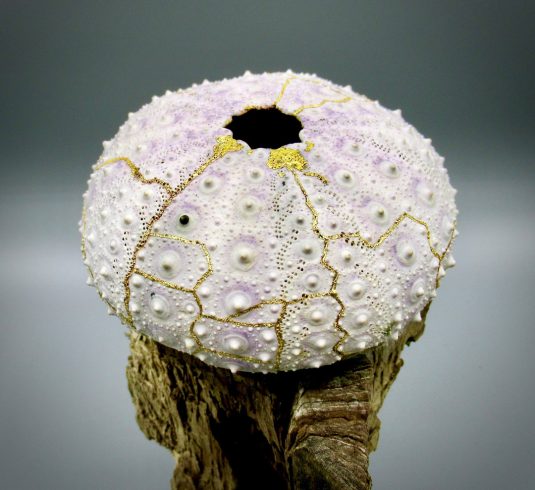
Kintsugi: The Restorative Art of Naoko Fukumaru
Portland Japanese Garden, Portland, OR - To Jan 27, 2025
Kintsugi is the Japanese art of mending broken things without hiding the repair work. The classic case is a broken ceramic vessel with gold lines that highlight the cracks, creating a new layer of decoration while disturbing our notions about throwing away damaged goods.
Naoko Fukumaru takes this 500-year-old art to the next level. The Vancouver, BC–based artist and professional conservator not only pieces pots back together, but she plays up her interventions with colors other than gold. She also mounts pieces in unexpected situations, such as attaching them to driftwood, and at her most creative, makes new objects and attaches them to the old, creating new sculptures.
Kintsugi means “golden joinery.” It is supposed to enhance the beauty and value of objects by celebrating their imperfection and impermanence, according to Fukumaru. Pieces of pottery are glued together using layers of tree sap called urushi (a natural lacquer) and gold dust, which sticks to the sap. Finally, the surface is polished.
Kintsugi relates to the Japanese concept of wabi-sabi, in that there is beauty in the flawed, the incomplete and the impermanent. Fukumaru ups the ante. On one red bowl, she adds dots either side of her gold lines, so that they look like stitches along a scar. Elsewhere she takes deformed 19th-century bowls that slumped during firing and works on them while they are still fused to the brown supports from the kiln. In another case, she sticks one to the side of some driftwood, another substance that has been changed by time and stress.
The smaller Tanabe Gallery is reserved for her more avant-garde work, such as plaster casts of crystals emerging from a pot, a broken sea urchin healed with red thread and interior gilding, and a bowl with one side replaced by fabric, in another reference to sashiko, the art of mending with embroidery.
Carolyn Supinka, assistant director of exhibitions at Portland Japanese Garden, told Preview that the show “celebrates healing, mindfulness and the connection to nature,” adding that it is something that the post-COVID world is craving. Supinka said she hopes garden visitors will be inspired by Fukumaru’s art to think about imperfection and healing, and return to the garden with “a renewed sense of attention to detail and the beauty in imperfection around them in everyday life.”
Kintsugi workshop with Emi Joyce Nov 9, 9:30am–12:30pm or 1:30–4:30pm

